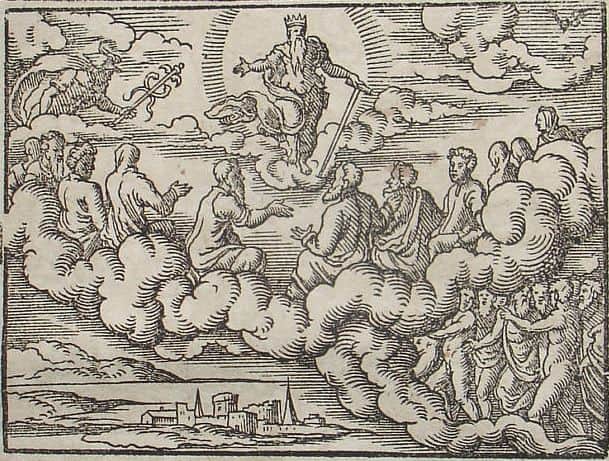Did you know that the ancient Israelites believed in more than one god?
I’m sensing I should explain that.
What I mean is that the Israelites, at least for part/most of the biblical period, assumed the existence of many gods. They were not monotheists (belief that only one god exists). That would come later in their story. But neither were they polytheists (worship of multiple gods).
They were monolatrous (Greek latreuō = worship): many gods exist, but only one God, Yahweh, is worthy of worship.
That’s why the 10 Commandments begin “You shall have no other gods before me”—which is better understood as “don’t worship other gods besides me.” And if the Israelites were to bow down and worship them, then God would become “jealous”(Exodus 20:3-5).
Rather than saying, “There are no other gods, so get that thought out of your head,” they are told not to worship them.
The Israelites, after all, lived in a world where every nation around them had its own high god. The Moabites had Kemosh, the Ammonites had Milcom, the Canaanites had Baal, and on it goes.
Gods were as plentiful as fire hydrants and traffic lights.
The Israelites expressed their faith in Yahweh by way of contrast to these other gods who were understandably assumed to exist, not by discounting their existence—that would be asking too much of them.
Imagine today a decree coming down from the top saying, “You may only do your banking in one specific branch (Main Street) of one local bank (Springfield Savings and Loan). You may not bank anywhere else, neither at Wells Fargo, nor Citizens Bank, nor even Bank of America. Nor may you do your banking at the various ATM’s that dot every street and mall.”
To have told ancient Israelites that they were to worship only Yahweh because, actually, no other gods existed would have been as absurd as expecting us to believe that these other banks, branches, and ATMs don’t exist. “What do you mean they don’t exist?! We see them all over the place!” Same holds for the ancient Israelites: high places (altars), temples, and images/idols were part of their landscape, an “assumed reality.”
And so we see (to name a few more examples) Psalm 95, a psalm that calls Israel to worship Yahweh alone and describes Yahweh as “a great God, and a great king above all gods” (v. 3). It’s hard to interpret this as anything other than what it looks like: Yahweh is praised for being greater than the other gods.
Or look at the “divine council” in Psalm 82. Yahweh is the “Most High,” like the chairman of the board over the other gods and chiding them for not doing their job of ruling justly over the nations: “How long will you judge unjustly and show partiality to the wicked?” (v. 2; see also Psalm 58:1-2).
Next, the gods find themselves out of work.
I say, “You are gods, children of the Most High, all of you; nevertheless, you shall die like mortals, and fall like any prince.” Rise up, O God, judge the earth; for all the nations belong to you! (vv. 6-8)
This divine council shows up in Job 1-2, another “heavenly board room” scene.
One more example is Exodus 12:12. On the first Passover, just before the 10th and final plague, we read:
For I will pass through the land of Egypt that night, and I will strike down every firstborn in the land of Egypt, both human beings and animals; on all the gods of Egypt I will execute judgments: I am Yahweh.
The plagues are judgments on Egypt’s gods. Turning the Nile to blood is an attack against the Nile deity; the plague of frogs is an attack on the Heqet, the goddess of fertility, depicted with the head of a frog; the plague of darkness is an attack on the sun god Ra, the high god of the Egyptian pantheon.
To say that the Israelites were monolatrous is more than simply making an academic observation. It helps us make sense of some passages and pulls back the curtain to help us understand a bit more of Israel’s theology.
To say that Yahweh was above all the other gods and the only one worthy of worship may not mean much to us. It may even seem uncomfortably wrong for such a thing to be in the Bible.
But for the ancient Israelites, such a claim was countercultural and odd-looking. It was a bold and theologically potent declaration.
If we want to understand Israel’s theology, we need to take these and other passages at face value.

